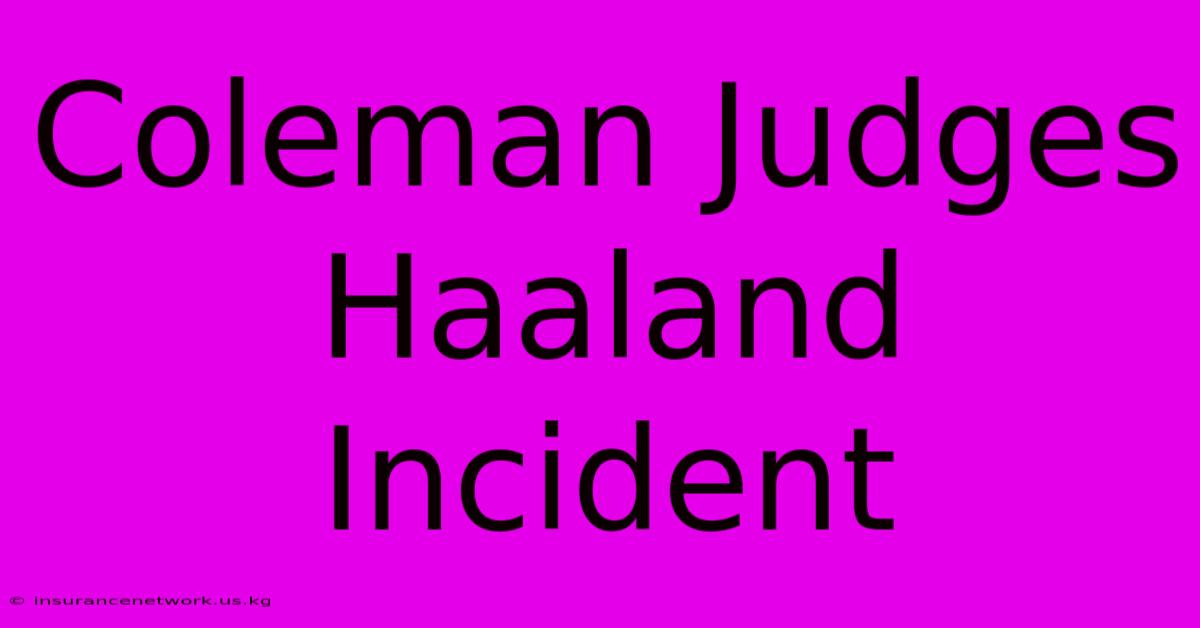Coleman Judges Haaland Incident

Discover more detailed and exciting information on our website. Click the link below to start your adventure: Visit Best Website insurancenetwork.us.kg. Don't miss out!
Table of Contents
The Coleman-Haaland Incident: A Deep Dive into the Controversy
The recent incident involving Supreme Court Justice Clarence Thomas and his alleged financial dealings, coupled with Interior Secretary Deb Haaland's subsequent actions, has sparked a firestorm of debate. This article will delve into the specifics of the situation, exploring the criticisms leveled against both figures and the broader implications for American governance.
Understanding the Core Issue: Justice Thomas and the Allegations
The controversy centers around disclosures (or lack thereof) regarding Justice Thomas's financial relationships, particularly those involving Harlan Crow, a Texas real estate magnate. Allegations include undisclosed luxury travel and gifts received by Justice Thomas, raising questions about potential conflicts of interest and violations of ethics standards. Critics argue that these undisclosed relationships undermine public trust in the Supreme Court's impartiality. The lack of transparency has fueled calls for stricter ethical guidelines and greater accountability for Supreme Court justices.
Key Criticisms of Justice Thomas:
- Undisclosed Gifts and Travel: The most prominent criticism involves the alleged failure to disclose lavish gifts and travel provided by Harlan Crow. These gifts and trips raise serious questions about potential influence peddling and the appearance of impropriety.
- Lack of Transparency: The lack of proactive disclosure of these relationships is viewed as a deliberate attempt to avoid scrutiny and public accountability. This lack of transparency erodes public confidence in the integrity of the Supreme Court.
- Erosion of Public Trust: The cumulative effect of these allegations has significantly eroded public trust in the Supreme Court's independence and impartiality. Many argue that this damage is irreparable without significant reform.
Secretary Haaland's Response and the Subsequent Backlash
Secretary Haaland's response to the ongoing controversy surrounding Justice Thomas is where the situation becomes more complex. Her statements and actions have drawn both praise and condemnation. While some view her actions as necessary to uphold ethical standards and the rule of law, others criticize her stance as politically motivated and an overreach of her authority. The specifics of her response, and the subsequent criticisms, require careful consideration.
Points of Contention Regarding Secretary Haaland's Actions:
- Alleged Political Motivation: Some critics argue that Secretary Haaland's actions are politically motivated, aimed at undermining the conservative wing of the Supreme Court. They suggest her response is partisan and lacks impartiality.
- Overreach of Authority: Others question whether Secretary Haaland has the authority to publicly comment on or take action regarding the conduct of a Supreme Court Justice. This raises questions about the appropriate boundaries of executive branch power and judicial independence.
- Impact on Judicial Independence: Critics contend that Secretary Haaland's actions could set a dangerous precedent, potentially undermining the independence of the judiciary. They fear it could lead to future political interference in judicial decision-making.
The Broader Implications: Ethics, Transparency, and the Future of American Governance
The Coleman-Haaland incident highlights critical issues regarding ethics, transparency, and the future of American governance. The controversy underscores the urgent need for:
- Enhanced Ethical Guidelines: The incident exposes weaknesses in the existing ethical guidelines for Supreme Court Justices. Strengthening these guidelines is crucial to restore public trust.
- Increased Transparency: Greater transparency in the financial dealings of public officials is essential to ensure accountability and prevent conflicts of interest. This includes mandatory, comprehensive disclosure requirements.
- Strengthening Institutional Checks and Balances: The incident reveals the need for stronger institutional mechanisms to ensure accountability and prevent abuse of power.
The Coleman-Haaland incident is not simply a clash of personalities; it’s a critical examination of the foundational principles of American democracy. The ongoing debate promises to shape discussions about ethics, transparency, and the future of American governance for years to come. It serves as a stark reminder of the vital importance of upholding the highest ethical standards in public service.

Thank you for visiting our website wich cover about Coleman Judges Haaland Incident. We hope the information provided has been useful to you. Feel free to contact us if you have any questions or need further assistance. See you next time and dont miss to bookmark.
Featured Posts
-
Manmohan Singh Dies 2004 2014 Pm
Dec 27, 2024
-
Um Coach Larranaga Retires
Dec 27, 2024
-
Toledo Football Briggs Wild Win
Dec 27, 2024
-
Larranaga Leaving Miami Hurricanes
Dec 27, 2024
-
After Christmas Luggage Sale Up To 76 Off
Dec 27, 2024
